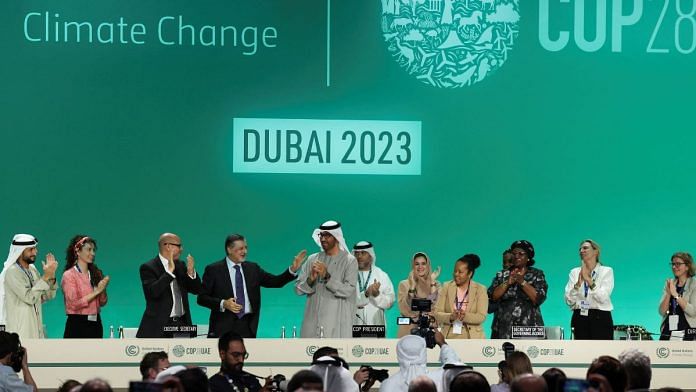New Delhi: On 13 December, during the United Nations 28th meeting of the Conference of the Parties (COP28) in Dubai, representatives from almost 200 countries achieved a milestone — they adopted the final ‘Global Stocktake’ text which, for the first time in COP history, explicitly mentions the need to “transition away” from fossil fuels as a pivotal measure to combat climate change.
After negotiations extended beyond the scheduled duration by a day, COP28 President Sultan Al-Jaber hailed the final text as “historic” and underscored the need to implement the decision to reach net-zero CO2 emissions in the world by 2050.
“For the first time, the UN climate talks have addressed the need to stop burning fossil fuel. COP28 marks the beginning of the end of the fossil fuel era. This outcome must be harnessed by governments and markets, but the outcome signals the beginning of the end for coal, oil, and gas in the global economy,” Linda Kalcher, executive director of European think tank Strategic Perspectives, said in a statement to the media.
The Global Stocktake is the first progress report of the work carried out by the signatories to the 2015 Paris Agreement to mitigate global warming. The text contains information on nationally determined contributions of each country which are expected to be updated starting late 2024.
The final statement also reminds the countries of their pledge to triple renewable energy capacity by 2030. The phase-down of unabated coal power — a point asserted by India and China due to their coal-dependency — remained in the final text this year, similar to COP27 and COP26.
R.R. Rashmi, a Distinguished Fellow at TERI, said in a statement, “The (final) decision highlights the need for orderly and just transition in all energy systems, but singles out the need for phasing down unabated coal plants. This tilts it against developing countries.”
Another crucial point in the climate deal is its reference to ‘transitional fuels’, which do not emit as much carbon as fossil fuels do and which can facilitate “energy transition while ensuring energy security”.
However, there is no mention in the statement as to which fuels are transitional fuels. The International Energy Agency describes natural gas as one. Some analyses show natural gas produces 50 percent less CO2 emissions compared to coal and petroleum, making it a less intensive fuel. However, natural gas fields around the world are responsible for emitting massive amounts of methane — which traps more heat than CO2 and is seen as more harmful — through leaks. According to the UN Environment Programme, it is responsible for “approximately a third of the warming we are experiencing today”, and needs to be reduced by 30-60 percent below 2020 levels by 2030 to limit global warming.
“The reference to “transitional fuels” explicitly gives gas producing countries the licence to sell more gas rather than invest in renewable energy,” said a statement by Ulka Kelkar, Executive Director, climate, World Resources Institute, India.
This COP was significant since it was hosted by a member of the Oil and Petroleum Exporting Countries (OPEC), an organisation that is a significant barrier in global calls to phase down fossil fuel usage.
The host for COP29 — Azerbaijan — is another fossil-fuel reliant nation and, much like the UAE, depends on oil and gas production for over 50 percent of its GDP.
The Dubai COP also saw a record high number of oil and gas lobbyists in attendance — 636 — according to an analysis by think tanks Corporate Accountability, Corporate Europe Observatory, and Global Witness.
Incidentally, a meeting of Arab energy leaders’ on the sidelines of COP28 closed with a statement that said “oil and gas will be pillars of global energy for decades to come.”
Also read: Indian innovators are building on age-old traditions now—mud beehives to bamboo boats
‘Disappointing deal’
Negotiations in Dubai saw over 100 countries, including India and the US, pushing for the “phase-out of fossil fuels” to be included in the final version of the text. A draft version of the Global Stocktake text on 11 December had removed the words “phase out”, leading to an outcry by several countries, organisations and activists.
United Nations Secretary General António Guterres also urged countries to act pertinently and phase out fossil fuels to keep the 1.5 degree goal alive.
“After decades of evasion, COP28 finally cast a glaring spotlight on the real culprits of the climate crisis: fossil fuels. A long-overdue direction to move away from coal, oil, and gas has been set,” said Harjeet Singh of Climate Action Network International.
However, Singh recognised that the actual resolution is “marred by loopholes” giving the fossil fuel industry “numerous escape routes.”
The deal has also been called a compromise due to its lack of focus on climate finance. While it “recognises the challenges faced by developing countries” in terms of adaptation and finance, it does not say much on how to overcome them. Without elaborating on exact numbers and deadlines, the text only recalls that “developed countries shall provide adaptation and mitigation finance for developing countries.”
Recognising the issue with climate finance in the text, Singh said, “The final outcomes fall disappointingly short of compelling wealthy nations to fulfill their financial responsibilities — obligations amounting to hundreds of billions, which remain unfulfilled.”
(Edited by Zinnia Ray Chaudhuri)
Also read: India’s climate diplomacy moved from ‘can’t say yes’ to ‘can’t say no’ in a decade



